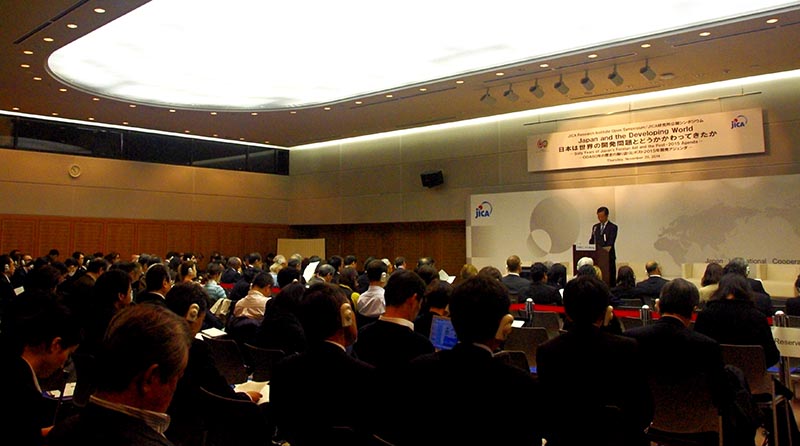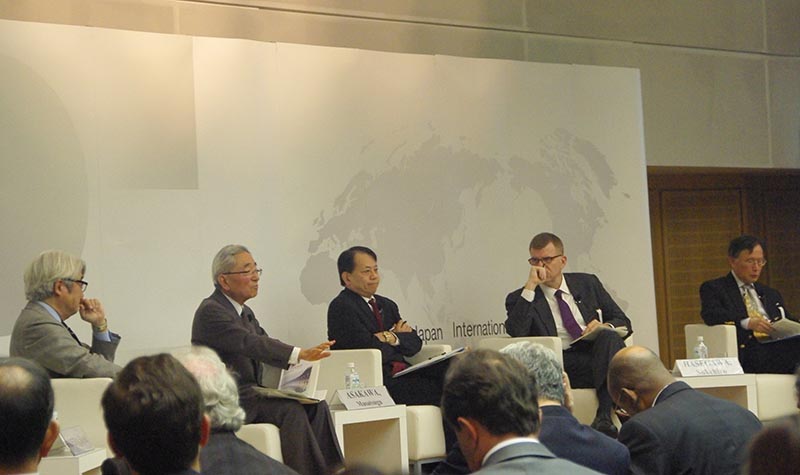Japan and the Developing World: JICA-RI Holds an Open Symposium for the 60th Anniversary of Japan's ODA
2014.11.28
On November 20, 2014, JICA-RI held an open symposium entitled “Japan and the Developing World: Sixty years of Japan’s foreign aid and the post-2015 agenda.”
The symposium was organized in commemoration of the 60th anniversary of Japan’s Official Development Assistance (ODA), which started in 1954 with Japan’s accession to the Colombo Plan. Within the context of the quickly approaching 2015 deadline to achieve the United Nations Millennium Development Goals (MDGs), there have been active discussions on post-2015 developments. In this context, JICA-RI initiated a research project on a historical analysis of Japan’s ODA. The final results of the research project will be published in a book next year.

Opening session
Featuring leading and influential thinkers and experienced practitioners of international development both from Japan and around the world, the event intended to critically review the 60-year history of Japan’s ODA and, based on the lessons drawn, look toward the future of international cooperation by Japan and other stakeholders around the world. There were 27 keynote speakers and panelists, ranging from researchers, Japanese government officials, the private sector, NGOs, developing countries, and international organizations who joined in the symposium. The event was attended by over 200 participants, some of whom were from diplomatic missions in Tokyo.
JICA President Akihiko Tanaka gave the opening remarks, which were followed by keynote addresses by distinguished speakers: Kimihiko Ishikane (Director-General, International Cooperation Bureau, Ministry of Foreign Affairs), Ibrahim Assane Mayaki (Chief Executive Officer, New Partnership for Africa’s Development (NEPAD)), Vo Hong Phuc (Former Minister of the Ministry of Planning and Investment, Vietnam), and Cyril Muller (Vice President, World Bank Group). The keynote addresses referred to the achievements and advantages of Japan’s ODA, as well as the opportunities and challenges in international cooperation for the future.

Panel discussion
The symposium consisted of four sessions. In Session 1 entitled “Overview and political economy of Japan’s foreign aid,” JICA Vice President Hiroshi Kato gave a retrospective overview of Japan’s ODA from the postwar era to the present day to kick off the discussion. Some of the points discussed among the panelists included the role of Japan’s ODA in promoting economic growth in Asian countries through industrialization, and the need for Japan to improve internal and external communication concerning its ODA policy.
In Session 2 “Asian development assistance models,” Yasutami Shimomura (Professor Emeritus, Hosei University) moderated the discussion on the characteristics and effectiveness of Asian development models. The panelists identified the common features of the ODA provided by Japan, China, and South Korea as assistance based on their own experience of development and an emphasis on comprehensive economic growth through infrastructure development to improve investment conditions. The panelists from India and Vietnam shared their experiences of Japanese assistance from the perspective of recipient countries.
In Session 3 with the theme of “Japan, MDIs, and the future of global governance in development finance,” JICA Vice President Kiyoshi Kodera first gave an overview of Japan’s relationships in the postwar history with international organizations such as the United Nations and the World Bank. During the following discussion, the importance of multilateral partnerships to tackle emerging global issues were highlighted, such as climate change and pandemics, and the value of the data and knowledge built up by international organizations as a global public good. It was also pointed out that Japan should maintain a consistent policy toward international organizations. With regard to emerging donors such as the Asian Infrastructure Investment Bank (AIIB), the expectation that these new actors adopt international best practices in environmental and social safeguard standards in their projects and programs was expressed among the discussants.
In the last session entitled “The future of ODA and the post-2015 agenda,” panelists from NGOs, private companies, foundations, and others discussed the future of international cooperation. Some of the significant aspects discussed included: the importance of building new partnerships based on the advantages and complementarities of each actor when the development actors are becoming more diverse, building a bottom-up system to work with the civil society, innovations in technology, humanitarian perspectives, and partnerships with the private sector.
JICA Senior Vice President Hideaki Domichi, in his closing remarks, concluded that Japan should enhance partnerships with various development actors throughout the world, based on the lessons drawn from the history, comparative advantages and constraints of its own development aid.
The results of this symposium will be reflected in the book that is the final outcome of the research project.
Video recordings from the symposium are available on YouTube.
https://www.youtube.com/user/jicaresearchinstitut/feed
Video interviews with the speakers at the symposium and researchers participating in the research project are also available on this website.
The details of the symposium program

事業事前評価表(地球規模課題対応国際科学技術協力(SATREPS)).国際協力機構 地球環境部 . 防災第一チーム. 1.案件名.国 名: フィリピン共和国.

事業事前評価表(地球規模課題対応国際科学技術協力(SATREPS)).国際協力機構 地球環境部 . 防災第一チーム. 1.案件名.国 名: フィリピン共和国.

事業事前評価表(地球規模課題対応国際科学技術協力(SATREPS)).国際協力機構 地球環境部 . 防災第一チーム. 1.案件名.国 名: フィリピン共和国.

事業事前評価表(地球規模課題対応国際科学技術協力(SATREPS)).国際協力機構 地球環境部 . 防災第一チーム. 1.案件名.国 名: フィリピン共和国.

事業事前評価表(地球規模課題対応国際科学技術協力(SATREPS)).国際協力機構 地球環境部 . 防災第一チーム. 1.案件名.国 名: フィリピン共和国.
scroll